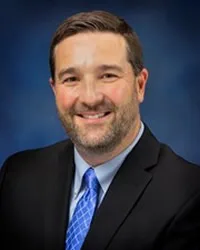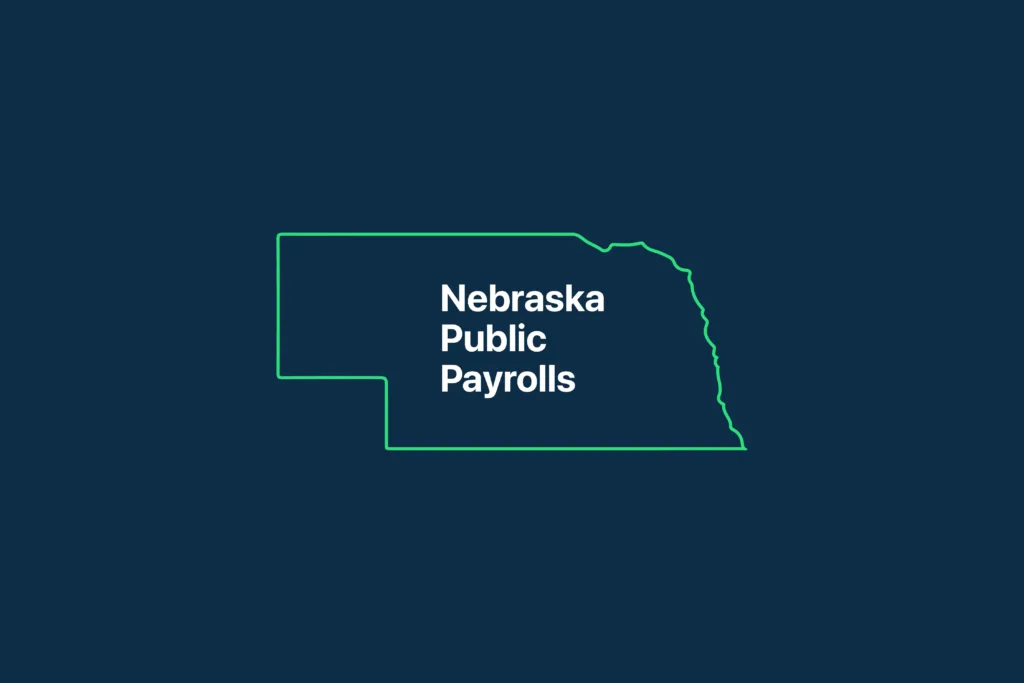John Dent, Nebraska Public Power District’s chief nuclear officer, made a base salary of $646,000 in 2023, an amount similar to other public power executives in Nebraska.
But after a bonus of $640,280, his total compensation doubled his salary to $1.3 million.

That bonus made the NPPD executive the highest paid public official of the 14 public agencies analyzed by the Flatwater Free Press – higher even than his boss. But CEO Thomas Kent and a number of other top earners at NPPD all also saw their 2023 salaries padded by significant bonus pay, ballooning their total earnings well above Nebraska’s other public servants, including other public power execs.
Khalil Dia, an NPPD nuclear site vice president, received a $261,334 bonus in 2023, around 60% of his base salary. Billy Chapin, a general manager of plant operations, got a $128,415 bonus, 40% of his base pay.
Sen. Tom Brewer, chair of the Nebraska Legislature’s Government, Military and Veterans Affairs Committee, said NPPD’s compensation is shocking because executives’ base salaries are already higher than state officials, including the governor and attorney general.
“Why would you double someone’s pay that hasn’t done anything that special when you could take that money and roll it into reducing rates?” Brewer said.
Dent, Dia and Chapin are the three highest ranking executives at Cooper Nuclear Station, located in southeast Nebraska, which NPPD says generates enough electricity to provide power to 385,000 customers.
There’s serious competition for hiring management talent within the nuclear industry, said Dallas Beshaler, NPPD’s vice president of human relations. That’s why the top Cooper Station executives can receive bonuses at percentage levels beyond NPPD’s normal incentive program, he said.
Dent’s 2023 bonus, nearly 100% of his base salary, was awarded under a previous nuclear-focused incentive program, Beshaler said.
“If there’s any industry in the world where you want to make sure you minimize risk, and maintain staffing, so that there are no gaps there, it’s the nuclear industry,” Beshaler said. “That’s why it is competitive. And that’s why you’ll see some of those incentives out there.”
37,000+ employee records
The Flatwater Free Press’ updated public payroll database now allows you to search the salaries and total compensation of public employees in 14 different organizations, including the State of Nebraska and its largest counties, power districts and cities. Explore »
By contrast, roughly 200 NPPD employees – including line technicians, chemists and engineers – received 2023 bonus pay between $76 and $306.
Payments under that “bonus” category in the records NPPD provided for the Flatwater Free Press’ Public Payrolls database include any incentives for qualifications like EMT, fire brigade, nuclear officer licenses and on-call pay.
“If you look during that really cold period we had in early January, there were linemen who were out there in some of the worst conditions,” Brewer said. “Why wouldn’t they be the ones that got a bonus? An extra half million dollars could go a long way toward putting a lot of those guys in a position to want to stay as a part of the team.”
Kent, NPPD’s CEO and president, made a base salary of $693,665, but a $207,558 bonus and $65,890 in miscellaneous pay inflated his total compensation to $967,113.

As CEO, Kent receives a bonus that is individually determined by the board of directors each year, because the board chair is technically his supervisor, Beshaler said.
Kent’s bonus payment alone was nearly double the salary of Nebraska Gov. Jim Pillen.
Many Nebraskans are concerned about public power districts because they depend on those services, said Jack Gould, former issues chair for Common Cause Nebraska. They deserve transparency around NPPD’s decisions, he said.
“Setting the salary and giving out bonuses and those kinds of things ought to be fully disclosed to the public,” said Gould. “How do you justify that in the eyes of the public? What do you do in that job that warrants a bonus? That ought to be fully explained.”
NPPD has also compensated its executives since 2007 with yearly contributions to their 401(k) up to the federal maximum, around $22,000, Beshaler said. Those payments appear in the “other pay” category of the Public Payrolls database, which also includes wellness incentives and unused vacation day payouts.
Kent takes compensation recommendations to NPPD’s board each December, which include any adjustments to executive wages and 401k incentives, Beshaler said.
All other NPPD employees will be eligible to receive bonuses in 2024 based on the goals and percentage scale in the new annual incentive program. The vice president level is eligible for a 30% bonus, outlined in program documents sent to employees.
Under that same program, employees below the supervisor level, called individual contributors, will be eligible for bonuses either 2.5% or 5% of their salaries.
The incentive program has been budgeted for 2024 with no increases to NPPD’s rates, Beshaler said, and won’t have any impact on customers.
NPPD says it sets compensation, especially at the upper levels, to be competitive with both private utilities and data centers, which Beshaler said have been increasingly interested in hiring executives from public power.
Nebraska is the only state in the country that is served entirely by publicly owned utilities, NPPD says. Around 70% of the country is served by private, investor-owned utility companies, said David Pomerantz, executive director of the Energy and Policy institute.
Those investor-owned utility companies pay CEOs millions more in total compensation than NPPD does, Pomerantz said, mostly through extra incentives based on the company’s earnings.

“We’re looking at big numbers to the average person … but when you start looking at what Tom Kent, our CEO, could make if he went to Iowa or Missouri and worked for an investor-owned utility, his compensation would be in the millions,” Beshaler said. “So it is a challenge for us on a year to year basis to remain competitive, and to create a structure that keeps people here.”
A huge part of the appeal of public power like Nebraska’s system is that ratepayers don’t have to “foot the bill” for exorbitant CEO pay, Pomerantz said.
“If ratepayers feel like they’re overpaying for any of the executive salaries, if they feel like those bonuses are too high, or the salaries are too high, they do have some measure of accountability over that through the board,” Pomerantz said.
Nebraska’s two other large public power organizations did not compensate executives with additional pay anywhere near NPPD’s scale in 2023.
Omaha Public Power District’s CEO Luis Javier Fernandez received no bonus in 2023 and made a little less than his annual salary rate at $764,330.
Only two OPPD executives received pay that exceeded their annualized salaries: Kathleen Brown received about $10,000 and Lisa Olson received a little over $4,000.
OPPD employs 2,148 people, a few hundred more than NPPD’s 1,814 employees.
Lincoln Electric System does not pay any bonuses to its 532 employees, General Counsel Shelley Sahling-Zart said in an email. Some employees receive additional pay for factors including senior pay, reimbursements and on-call days.
Kevin Wailes received about $1,700 in additional pay on top of his $575,693 base salary as CEO of LES in 2023. He retired at the end of the year.
Executive salaries at all three major public power districts are far higher than any State of Nebraska employee or any employee of the five most populated counties and cities, Flatwater’s analysis found.
Roger Donovick, the State of Nebraska’s medical services director and highest paid employee, made $408,450 in 2023. Douglas County’s medical director Sidney Kauzlarich, the highest paid county official, made $392,587.
Sen. Brewer and staff members said they were surprised to hear how much more the state’s public power executives made than other public officials, especially with NPPD’s added bonuses.
“I would rather see less pay at the top and lowering user rates, because all of Nebraska benefits from that, not an individual or two or three,” Brewer said.





8 Comments
The nuclear industry as a whole pays higher wages than fossil fuel utilities. Nppd and it’s Board have maintained steady rates to the customers for years. There is criticism of the higher execs at the nuclear plant without any background into their experience, qualifications, or performance. John Dent is a great leader who has helped to guide Cooper’s performance to one of the top operating nuclear plant in the US. My opinion he has earned what he was paid. He could easily go somewhere else and make a lot more, but he believes in CNS and the employees. Just my opinion.
This needs to stop… they just increased our rate for energy during hard times. He makes nearly 30X the median average for north platte with bonuses?? Cmon.
FFP is doing a great job! How about an investigation into how the Boards of Directors of these public utilities are appointed. Are there “good old boy/girl” networks in operation so that these often lucrative appointments go to friends or relatives of staff executives or others? What are the compensation/benefits packages of these Board members, most of whom probably meet a few times a year at most. I tried to get this information from Blue Cross as I am a policyholder, but was told in essence that it’s none of my business.
Shocking numbers! I appreciate the efforts it took to provide this information.
There is no doubt, this is the same as communism.
Limits on CEO and executive pay is long long overdue, on all levels of our corrupt private enterprise. Just the facts.
Give an employee a chance to speak. Now I had no clue of the bonuses and I didn’t care. Our executive team worries about the employees and the customers and that’s it! Did I get a bonus? Nope…. But my wage went up not so long ago and significantly and I’m not a manager or executive! NPPD is a great place to work! We have very capable people! We’re a damn family! We serve the customers at our highest potential, and we keep rates at bay!
The people that think execs/employees are being overpaid are clueless, including Sen. Brewer. Go ahead and replace everyone with someone making the median income and see how long you have power. Look at how much they make and divide that by the number of customers served. You’re talking about a couple of dollars per year if you were to use that money to lower rates. Hardly worth the trade off of having competent people providing your power.